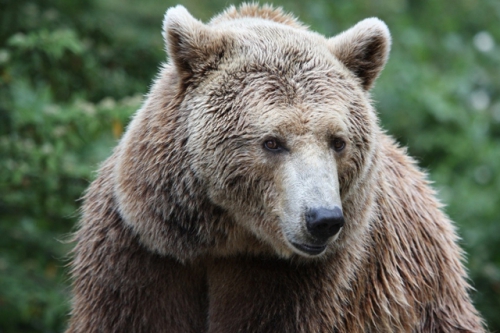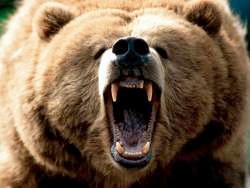samedi, 26 septembre 2015
The Powerful Bear In The Northern Tradition

The Powerful Bear In The Northern Tradition
by Arith Härger
Ex: http://artihharger.wordpress.com
As the other day i wrote about the Boar as a very powerful symbol in the old European Traditions, i wouldn’t want to left another powerful animal behind, which is the Bear, strongly worshiped by both Europeans and the indigenous inhabitants of northern America and Alaska.
For many cultures, Bears were the kings and queens of beasts, the rulers of the wild, the animal on the top of the food chain, for animals such as lions or other fearsome large felines didn’t exist in these areas, well in truth they did but it was so long ago and for a short period of time in the early human lives, that people gave more importance to the Bear, for that animal accompanied the lives of human beingsfor much longer The Bear was also considered to be the old, wise and wild brother of us humans, as Bears can stand upright like we do and walk if only for short periods. For this reason, the Bear was thought to be the mediator between us humans with the spirits, and there was much respect for this animal, caves were found, containing arranged Bear skulls, in honor to these creatures, as altars from the Paleolithic era, a cult to the Bear that dates from at least twenty thousand years ago (20.000).
Bears used to be all over Europe, from the far shores of the Mediterranean Iberian Peninsula, all the way up to the North of Scotland, to Scandinavia and the Eastern regions of Siberia, unfortunately nowadays we can only find these creatures in the cold north regions, and the tales about bears from the people living in those regions are many especially from the Finns, Saami and the Siberian tribes.
The bear wasn’t just a sacred animal to these people, it was also the source of food, even to the Saami before they had learnt to have reindeer herds, but the respect for this animal wasn’t less just because of that, as a matter of fact most animals that were sacred were also eaten and there was always respect for these creatures and there was always special rituals to hunt an animal, to honor the spirit, the life and to thank them for their purpose. In the case of hunting a bear, it was always done during the hibernation of the animal but it was always awakened first, because killing a bear during their sleep, was considered to be dishonorable for both the hunters and the bear, and cowardice for the hunters, after the successful killing of the animal, the hunter or the hunters had to pass through many rituals in order to be safe for the hunters to get in the village, so people could be saved from the spirit of whom the hunters had killed, to keep the spirit from having its revenge upon the tribe, or to keep the spirit of the Bear King or Queen from having its revenge for killing one of its children. During the time of the rituals, no one could look the hunters in the eyes nor talk to them, only the hunters could butcher and cook the body and no one else could come near it before it was ready to be eaten. Before the feast began, a speech of apology and thankfulness was given to the bear, and afterwards the bonés of the animal were buried in a sacred place. These king of acts are still very common amoung shamanic tribes that still exist today, the so called taboos among the shamans and their families, and everyone must respect that and the spirit of the animals in order to safeguard the families and have prosperity and happiness.
 To the Norse people the Bear was also a very powerful symbol very much attached to their beliefs and their warrior cults. People believed in many gods but there was always a group of people, a cult, dedicated to just one specific god, and in the Norse culture the warriors dedicated to Odin were called Berserkers, whose name comes from the word Bersark which means literally bearskin, which they wore for magical purposes and to honor the strength of the bear and become like him, fierce, strong, ferocious, violent in battle. These warriors would enter in an altered state of mind and call upon the spirit of the bear, becoming a bear themselves so they would not feel any pain during the battle, in order to keep the fight longer, roaring, putting fear upon their enemies. There are many accounts of this, of these warriors taking the amanita muscaria mushrooms, to enter in trance, and go completely crazy, becoming beasts ( this is from where and why the English word Berserker, or to go Berserker, came from ) wearing bear skins and nothing else, and sometimes even totally naked while going to battle and use their own hands and teeths to kill the enemies and tear off their armour and break their shields.
To the Norse people the Bear was also a very powerful symbol very much attached to their beliefs and their warrior cults. People believed in many gods but there was always a group of people, a cult, dedicated to just one specific god, and in the Norse culture the warriors dedicated to Odin were called Berserkers, whose name comes from the word Bersark which means literally bearskin, which they wore for magical purposes and to honor the strength of the bear and become like him, fierce, strong, ferocious, violent in battle. These warriors would enter in an altered state of mind and call upon the spirit of the bear, becoming a bear themselves so they would not feel any pain during the battle, in order to keep the fight longer, roaring, putting fear upon their enemies. There are many accounts of this, of these warriors taking the amanita muscaria mushrooms, to enter in trance, and go completely crazy, becoming beasts ( this is from where and why the English word Berserker, or to go Berserker, came from ) wearing bear skins and nothing else, and sometimes even totally naked while going to battle and use their own hands and teeths to kill the enemies and tear off their armour and break their shields.
Note: If you have any questions for me or if you want to see my artistic works, check out my Facebook page and make a Like if you can by following this link –> http://www.facebook.com/ArithHarger
00:05 Publié dans Traditions | Lien permanent | Commentaires (0) | Tags : tradition, tradition nordique, mythologie nordique, scandinavie, ours, bestiaire, faune européenne |  |
|  del.icio.us |
del.icio.us |  |
|  Digg |
Digg | ![]() Facebook
Facebook



Les commentaires sont fermés.